|
Dr. King Marches Against the War
in Viet Nam
in Chicago, March 1967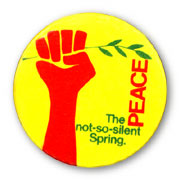
Browse photos of the march.
 On
March 25 1967, civil rights leader Dr. Martin Luther King, Jr. led 5,000
people down State Street in Chicago to protest the war in Viet Nam. This
was the first anti-war march that Dr. King had joined, and one more step
in his increasingly vocal opposition to the war. On
March 25 1967, civil rights leader Dr. Martin Luther King, Jr. led 5,000
people down State Street in Chicago to protest the war in Viet Nam. This
was the first anti-war march that Dr. King had joined, and one more step
in his increasingly vocal opposition to the war.
 Dr.
King had never been neutral on the war in Viet Nam but he had been silent.
He felt, as did the leaders of most other civil rights organizations,
that the movement should concentrate on the domestic struggle. They were
concerned that opposition to President Johnson's foreign policy
would result in loss of support for passing and enforcing civil rights
laws at home. Dr.
King had never been neutral on the war in Viet Nam but he had been silent.
He felt, as did the leaders of most other civil rights organizations,
that the movement should concentrate on the domestic struggle. They were
concerned that opposition to President Johnson's foreign policy
would result in loss of support for passing and enforcing civil rights
laws at home.
 Nonetheless,
many in the civil rights movement were angry when Johnson sent 3,500
combat troops to Viet Nam on March 7, 1965, while ignoring
attacks by Alabama state troopers on people trying to walk from Selma
to Montgomery demanding the right to vote. On July 5 1965, Dr. King told
a college audience in Virginia that "the war in Viet Nam must be
stopped." His
friends and contacts in the Johnson Administration told him he was treading
in dangerous waters and should back off. Nonetheless,
many in the civil rights movement were angry when Johnson sent 3,500
combat troops to Viet Nam on March 7, 1965, while ignoring
attacks by Alabama state troopers on people trying to walk from Selma
to Montgomery demanding the right to vote. On July 5 1965, Dr. King told
a college audience in Virginia that "the war in Viet Nam must be
stopped." His
friends and contacts in the Johnson Administration told him he was treading
in dangerous waters and should back off.
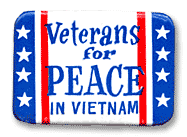  By 1967 Dr. King was ready to speak his mind publicly. His first statement
was made on February 25 at an anti-war conference in California, along
with several Senators who also opposed the war. He said it was immoral
and also took money and attention from the anti-poverty program. A week
before the Chicago march he agreed to participate in the Spring Mobilization
Against the War in New York City on April 15. By 1967 Dr. King was ready to speak his mind publicly. His first statement
was made on February 25 at an anti-war conference in California, along
with several Senators who also opposed the war. He said it was immoral
and also took money and attention from the anti-poverty program. A week
before the Chicago march he agreed to participate in the Spring Mobilization
Against the War in New York City on April 15.
 After the walk down State Street on March 25, Dr. King addressed a rally.
The following are excerpts of his speech: After the walk down State Street on March 25, Dr. King addressed a rally.
The following are excerpts of his speech:
 Poverty,
urban problems and social progress generally are ignored when
the guns of war become a national obsession. When it is not our
security that is at stake, but questionable and vague commitments
to reactionary regimes, values disintegrate into foolish and
adolescent slogans. Poverty,
urban problems and social progress generally are ignored when
the guns of war become a national obsession. When it is not our
security that is at stake, but questionable and vague commitments
to reactionary regimes, values disintegrate into foolish and
adolescent slogans.
 America
is a great nation,... [b]ut honesty impels me to admit that our
power has often made us arrogant. We feel that our money can
do anything. We arrogantly feel that we have some divine, messianic
mission to police the whole world. We are arrogant in not allowing
young nations to go through the same growing pains, turbulence
and revolution that characterizes our history... America
is a great nation,... [b]ut honesty impels me to admit that our
power has often made us arrogant. We feel that our money can
do anything. We arrogantly feel that we have some divine, messianic
mission to police the whole world. We are arrogant in not allowing
young nations to go through the same growing pains, turbulence
and revolution that characterizes our history...
 We
arm Negro soldiers to kill on foreign battlefields but offer little
protection for their relatives from beatings and killings in our
own South.... We
arm Negro soldiers to kill on foreign battlefields but offer little
protection for their relatives from beatings and killings in our
own South....
 All
of this reveals that our nation has not yet used its vast resources
of power to end the long night of poverty, racism and man's inhumanity
to man. Enlarged power means enlarged peril if there is not concomitant
growth of the soul. Genuine power is the right use of strength. If
our nation's strength is not used responsibly and with restraint,
it will be, following Acton's dictum, power that tends to corrupt
and absolute power that corrupts absolutely. All
of this reveals that our nation has not yet used its vast resources
of power to end the long night of poverty, racism and man's inhumanity
to man. Enlarged power means enlarged peril if there is not concomitant
growth of the soul. Genuine power is the right use of strength. If
our nation's strength is not used responsibly and with restraint,
it will be, following Acton's dictum, power that tends to corrupt
and absolute power that corrupts absolutely.
 Our
arrogance can be our doom. It can bring the curtains down on our
national drama. Ultimately, a great nation is a compassionate nation.
We are challenged in these turbulent days to use our power to speed
up the day when "every valley shall be exalted, and every mountain
and hill shall be made low; and the crooked shall be made straight,
and the rough places plain." Our
arrogance can be our doom. It can bring the curtains down on our
national drama. Ultimately, a great nation is a compassionate nation.
We are challenged in these turbulent days to use our power to speed
up the day when "every valley shall be exalted, and every mountain
and hill shall be made low; and the crooked shall be made straight,
and the rough places plain."
 Let
me say finally that I oppose the war in Viet Nam because I love America.
I speak out against it not in anger but with anxiety and sorrow in
my heart, and above all with a passionate desire to see our beloved
country stand as the moral example of the world. I speak out against
this war because I am disappointed with America. There can be no
great disappointment where there is no great love. I am disappointed
with our failure to deal positively and forthrightly with the triple
evils of racism, extreme materialism and militarism. We are presently
moving down a dead-end road which can lead to national disaster... Let
me say finally that I oppose the war in Viet Nam because I love America.
I speak out against it not in anger but with anxiety and sorrow in
my heart, and above all with a passionate desire to see our beloved
country stand as the moral example of the world. I speak out against
this war because I am disappointed with America. There can be no
great disappointment where there is no great love. I am disappointed
with our failure to deal positively and forthrightly with the triple
evils of racism, extreme materialism and militarism. We are presently
moving down a dead-end road which can lead to national disaster...
 Those
of us who love peace must organize as effectively as the war hawks.
As they spread the propaganda of war, we must spread the propaganda
of peace. We must combine the fervor of the civil rights movement
with the peace movement. We must demonstrate, teach and preach, until
the very foundations of our nation are shaken. We must work unceasingly
to lift this nation that we love to a higher destiny, to a new plateau
of compassion, to a more noble expression of humaneness. Those
of us who love peace must organize as effectively as the war hawks.
As they spread the propaganda of war, we must spread the propaganda
of peace. We must combine the fervor of the civil rights movement
with the peace movement. We must demonstrate, teach and preach, until
the very foundations of our nation are shaken. We must work unceasingly
to lift this nation that we love to a higher destiny, to a new plateau
of compassion, to a more noble expression of humaneness.

Photos of Dr. King's
Chicago March by Jo Freeman
|
Please click on thumbnails to view the complete
image
|
|
|
|
Dr. Martin Luther King talks to Al Raby
of Chicago's Coordinating Council of Community Organizations
(CCCO) as they lead the march down State Street. To King's
right is Jack Spiegel of the United Shoeworkers, and to Raby's
left is King assistant Bernard Lee.
|
|
| |
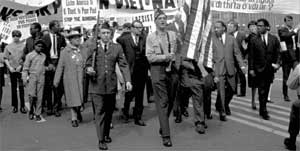 |
|
Veterans from earlier wars
demand peace in this war.
|
|
| |
|
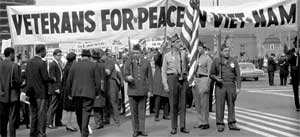
|
|
Veterans for Peace get ready
to march.
|
|
| |
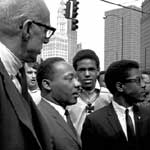 |
|
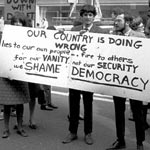 |
|
| |
Dr. Benjamin Spock joins Dr.
King and Bernard Lee in the front line.
|
|
|
|
| . |
While others line up on the
side.
|
|
|
| Signs express people's sentiments.
|
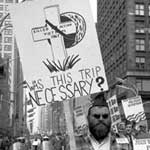 |
|
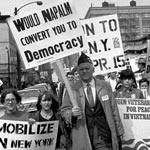 |
|
|
|
|
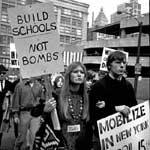 |
|
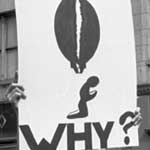 |
|
|
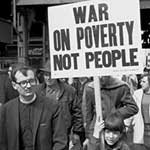 |
|
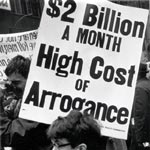 |
| |
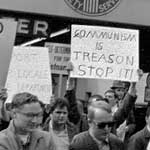 |
A few opponents of the march
protest from the sidewalk.
|
|
| |
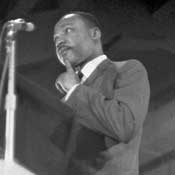 |
|
|
Dr. King addresses the closing
rally at the Coliseum.
|
|
| |
|
|